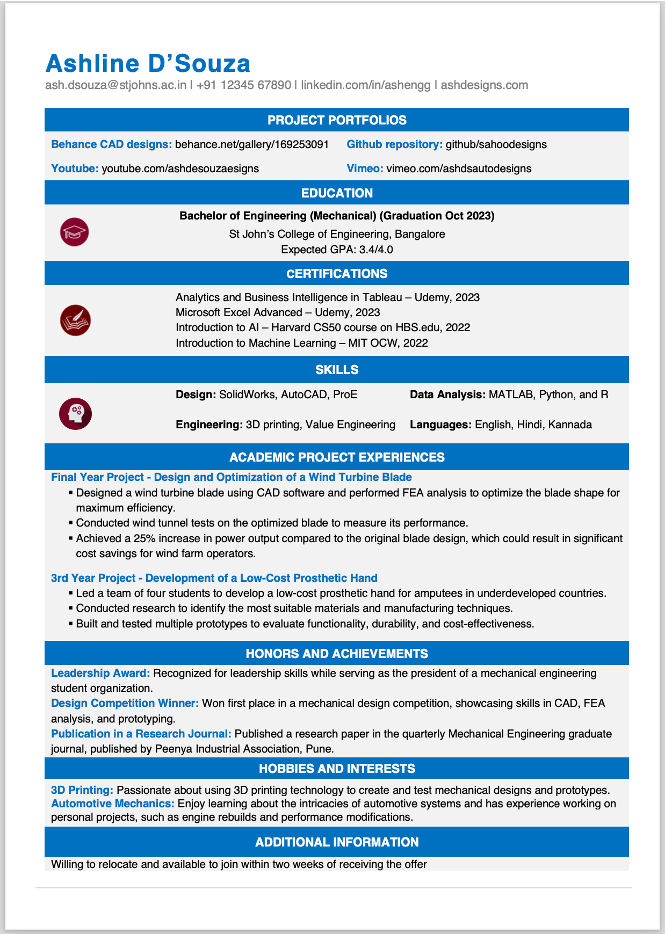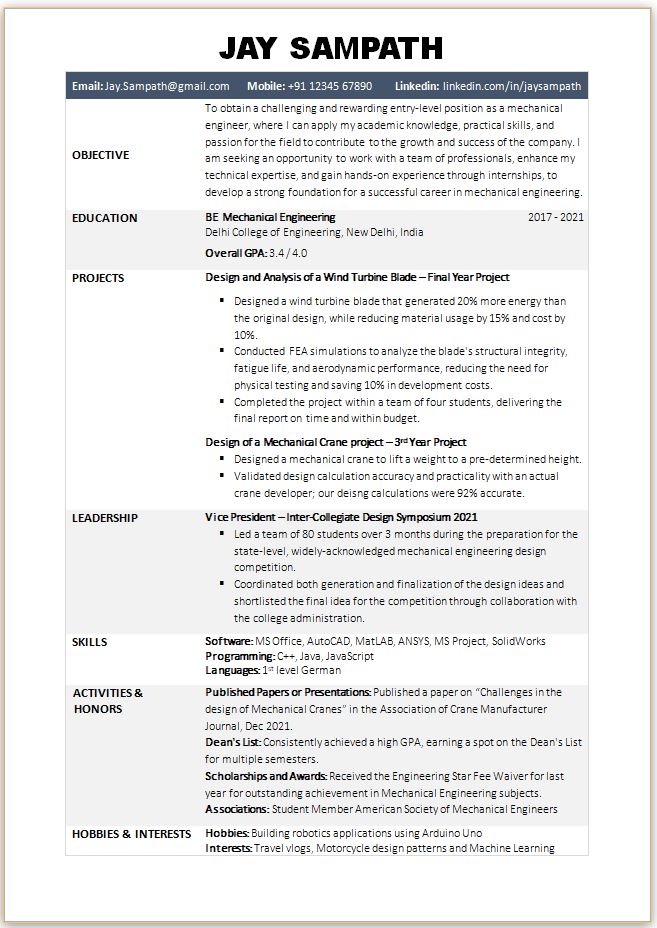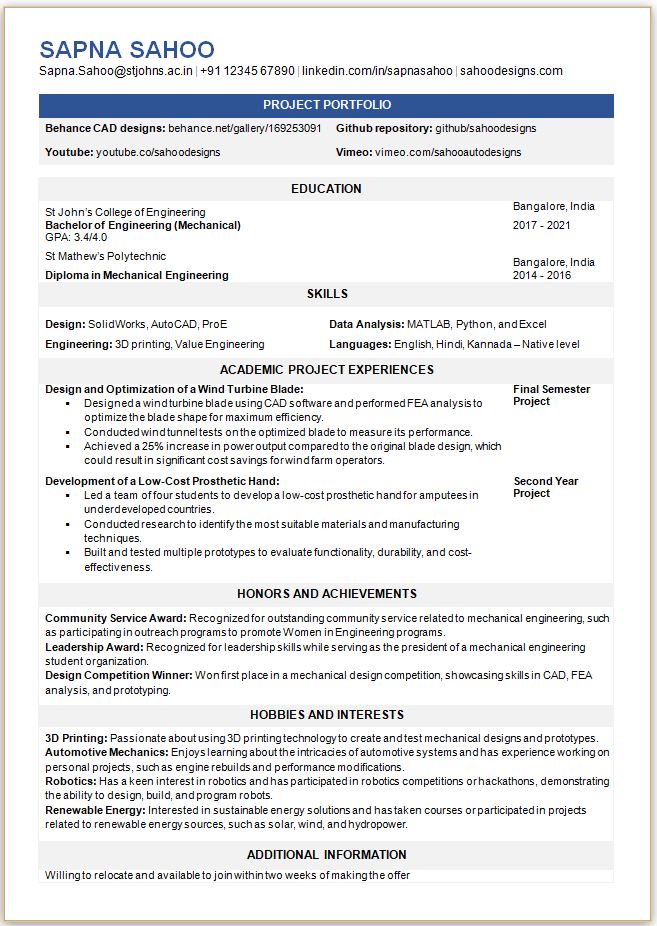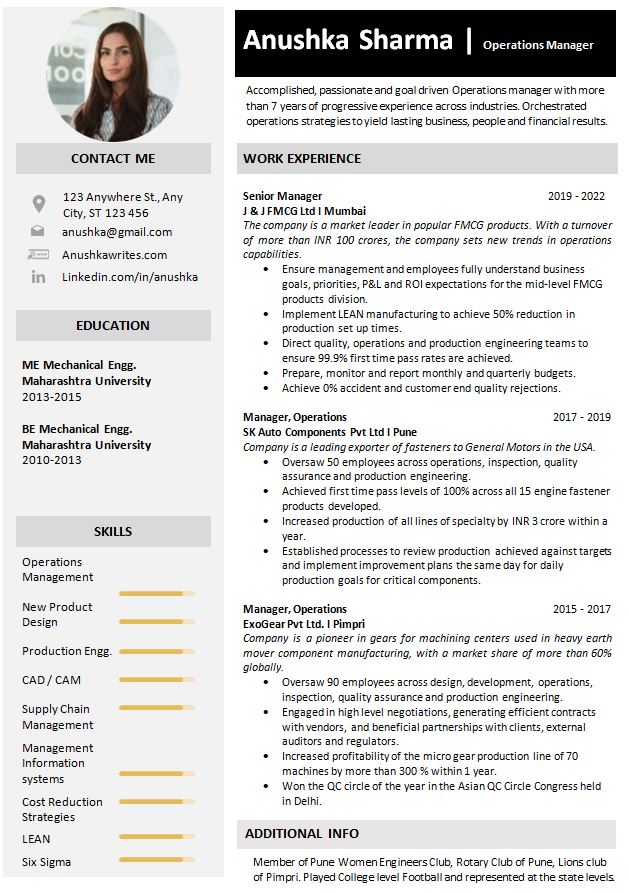Modern Resume
BE Mechanical Engineering Student Resume
Engineering Intern
BEMechStudent


Objective
We didn't include the objective in the template since it is a little tricky to include a very specific career objective because you wouldn't know which industry or a function you would apply to in future; but, if you want to include a generic objective, here is one for you to consider. Enthusiastic and highly motivated Mechanical Engineering graduate with a strong passion for design and a keen interest in the automotive industry. Eager to apply my technical skills and knowledge to contribute to the development of innovative automotive solutions. Aspiring to work in a dynamic and challenging environment where I can leverage my creativity and engineering acumen to design cutting-edge products and drive advancements in the automotive sector.
Education
BE Mechanical Engineering, BE Mech, Bachelor of Engineering - Mechanical
Skills
We have put together a list of top 10 technical skills that mechanical engineering students should consider including in their resume:
CAD Software Proficiency:
Demonstrating proficiency in Computer-Aided Design (CAD) software, such as AutoCAD, SolidWorks, or CATIA, showcases your ability to create and modify engineering drawings and models.
Finite Element Analysis (FEA):
Familiarity with FEA software, like ANSYS or Abaqus, indicates your capability to analyze the structural integrity and performance of mechanical components and systems.
Thermodynamics and Heat Transfer:
Strong knowledge of thermodynamics and heat transfer principles is crucial for designing and analyzing thermal systems, engines, and heat exchangers.
Mechanical Design and Engineering:
Highlighting expertise in mechanical design principles, including component sizing, material selection, and manufacturing processes, demonstrates your ability to create efficient and reliable mechanical systems.
Engineering Mechanics:
Proficiency in engineering mechanics concepts, such as statics, dynamics, and mechanics of materials, is fundamental for analyzing and designing mechanical structures.
Fluid Mechanics and Fluid Dynamics:
Familiarity with fluid mechanics and fluid dynamics is essential for designing fluid systems, pumps, and turbines. Manufacturing Processes: Understanding various manufacturing processes, such as machining, casting, and welding, illustrates your ability to design products with manufacturability in mind.
Control Systems and Automation:
Knowledge of control systems and automation is valuable for designing automated processes, robotics, and mechatronic systems.
Materials Science and Engineering:
Demonstrating knowledge of materials science and engineering principles is important for selecting appropriate materials based on their properties and applications.
Engineering Software and Programming:
Familiarity with engineering software, such as MATLAB or Python, allows you to perform data analysis, simulations, and automate engineering tasks.
Including these technical skills in your resume showcases your proficiency in essential areas of mechanical engineering and can make you a competitive candidate for internships, entry-level positions, and future career opportunities in the field.
Projects
If you are into engineering product design and want to showcase your design skills, here are two project ideas for you to work on. Pay attention to how we have quantified the results of the achievements. It is important to quantify your achievements.
Project 1:
Design and Prototyping of a Solar-Powered Water Purification System:
Objective:
Design and develop a solar-powered water purification system to provide clean and potable water in rural areas.
Description:
As part of a team project during my mechanical engineering studies, we conceptualized, designed, and prototyped a solar-powered water purification system. The project involved conducting research on water purification methods, analyzing design requirements, and selecting appropriate materials and components. We utilized CAD software to create 3D models and performed simulations to optimize the system's efficiency. After extensive testing and iterations, we built a working prototype that effectively purified contaminated water using solar energy. This project allowed me to enhance my engineering design skills, collaborate with team members, and apply problem-solving techniques to real-world challenges.
Quantified Result:
Achieved a water purification rate of 95% and successfully implemented the prototype in a field test, providing clean water to a rural community of 100+ individuals.
Interests/Hobbies
If you think you do not have a lot of leadership examples to talk about in general and during the interview, below are some hobbies and interests that you can consider including on your resume, provided you also have been genuinely passionate about these hobbies and interests
Student Government or Club Leadership:
Mentioning your active involvement in student government or leadership roles within clubs or organizations highlights your experience in leading and organizing events or initiatives.
Volunteering and Community Service:
Participating in volunteer activities and community service projects shows your willingness to take the lead in giving back to the community and making a difference.
Team Sports and Athletics:
Involvement in team sports and athletics can demonstrate your ability to work collaboratively, motivate others, and take on leadership roles on and off the field.
Debate Club or Public Speaking:
Engaging in debate club or public speaking activities indicates your confidence in expressing ideas, influencing others, and leading discussions.
Event Planning and Coordination:
Mentioning your experience in planning and coordinating events, whether it's for school, charity, or personal projects, showcases your organizational and leadership skills.
Peer Tutoring or Mentoring:
Participating as a peer tutor or mentor illustrates your ability to guide and support others, showcasing leadership through teaching and mentorship.
Entrepreneurship and Startups:
Involvement in entrepreneurship or startup ventures demonstrates your initiative, innovation, and ability to take charge in bringing ideas to fruition.
Leadership Workshops and Training:
If you have attended leadership workshops or training programs, mentioning them indicates your commitment to enhancing your leadership skills.
Project Management:
Describing how you managed and led group projects during your academic journey highlights your ability to lead teams effectively to achieve common goals.
Organizing Fundraisers or Campaigns:
If you've been involved in organizing fundraisers or awareness campaigns, it demonstrates your leadership in mobilizing people for a cause.
When mentioning hobbies and interests, try to provide brief descriptions or examples of how each activity allowed you to demonstrate leadership skills. This will add more substance to your resume and help potential employers or institutions understand the impact you have made through your leadership experiences.
Experience
Project 2:
Autonomous Robotic Arm for Industrial Assembly:
Objective: Design and construct an autonomous robotic arm capable of performing complex assembly tasks in an industrial setting.
Description:
For my senior capstone project, I led a team in developing an autonomous robotic arm that could mimic human-like movements to assemble intricate components in an industrial environment. The project involved integrating sensors, actuators, and programming algorithms to enable the robotic arm to recognize and manipulate objects with precision. We conducted extensive testing to ensure safety and accuracy, and we implemented machine learning algorithms to improve the arm's efficiency over time. Through this project, I honed my skills in engineering design, programming, and project management, and I gained valuable experience in leading a multidisciplinary team.
Quantified Result:
Achieved an assembly precision rate of 98% and reduced the assembly time by 30%, showcasing the robotic arm's effectiveness in an industrial production environment.
These student projects demonstrate your practical experience in engineering design and showcase your ability to apply engineering principles to create innovative solutions. Highlighting quantified results and the skills gained through these projects can make them valuable additions to your resume when applying for engineering product design roles.
Additional Inputs
If you are a student in the final year of an engineering degree, now is the time to start engaging with the industry. Engaging with the industry is crucial to enhance your career prospects and gain practical experience. Here are some industry engagement efforts that you can start pursuing in their graduation year:
1. Internships and Co-op Programs: Seek out internships or cooperative education (co-op) programs with engineering firms, companies, or research institutions. These opportunities allow students to work on real projects, gain hands-on experience, and make connections in the industry.
2. Industry Seminars and Workshops: Attend seminars, workshops, and conferences organized by professional engineering organizations or industry experts. These events provide valuable insights into the latest trends, technologies, and best practices in the field.
3. Career Fairs and Networking Events: Participate in career fairs and networking events specifically targeted at engineering students. These events offer opportunities to interact with potential employers, submit resumes, and learn about job openings.
4. Research and Industry Projects: Collaborate with professors or research labs on industry-related projects. Engaging in such projects can provide exposure to real-world challenges and facilitate networking with professionals in the industry.
5. Join Engineering Organizations: Become a member of engineering societies or organizations related to your field of interest. Engaging with these organizations can provide access to industry publications, webinars, and networking opportunities.
6. Alumni Networking: Leverage your college's alumni network to connect with graduates currently working in the engineering industry. Alumni can provide advice, mentorship, and potential job leads.
7. Capstone Projects: Work on capstone projects that have real-world applications or are sponsored by industry partners. This allows you to demonstrate your problem-solving skills to potential employers.
8. Volunteer and Pro Bono Projects: Engage in volunteer or pro bono engineering projects that address community needs or social issues. Such projects demonstrate your commitment to making a positive impact through engineering.
9. Certification and Training Programs: Pursue relevant certifications or training programs, such as software certifications, project management, or industry-specific qualifications, to enhance your skill set.
10. Online Portfolios and LinkedIn: Create an online portfolio showcasing your engineering projects, coursework, and achievements. Maintain an updated LinkedIn profile to connect with industry professionals and recruiters.
Engaging with the industry during the graduation year not only provides valuable practical experience but also helps in building a strong professional network and positioning oneself as a competitive candidate in the job market. It is essential to be proactive, persistent, and open to learning and adapting to industry requirements to maximize the benefits of these engagement efforts.
Why this template works
This is a template handcrafted for students who do not have internship experiences and instead have project experiences to showcase their readiness for industry. This template works well because of its simplicity while providing ample space to include details that are typical of a student resume.


